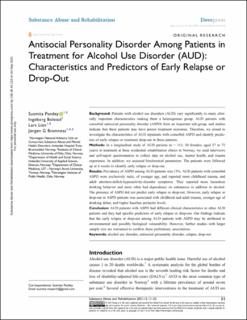| dc.description.abstract | Background: Patients with alcohol use disorders (AUD) vary significantly in many clinically important characteristics making them a heterogenous group. AUD patients with comorbid antisocial personality disorder (ASPD) form an important sub-group, and studies indicate that these patients may have poorer treatment outcomes. Therefore, we aimed to investigate the characteristics of AUD inpatients with comorbid ASPD and identify predictors of early relapse or treatment drop-out in these patients. Methods: In a longitudinal study of AUD patients (n = 113; 30 females; aged 27 to 72 years) in treatment at three residential rehabilitation clinics in Norway, we used interviews and self-report questionnaires to collect data on alcohol use, mental health, and trauma experience. In addition, we assessed biochemical parameters. The patients were followed up at 6 weeks to identify early relapse or drop-out. Results: Prevalence of ASPD among AUD patients was 15%. AUD patients with comorbid ASPD were exclusively male, of younger age, and reported more childhood trauma, and adult attention-deficit-hyperactivity-disorder symptoms. They reported more hazardous drinking behavior and more often had dependence on substances in addition to alcohol. The presence of ASPD did not predict early relapse or drop-out. However, early relapse or drop-out in ASPD patients was associated with childhood and adult trauma, younger age of drinking debut, and higher baseline prolactin levels. Conclusion: AUD patients with ASPD had different clinical characteristics to other AUD patients and they had specific predictors of early relapse or drop-out. Our findings indicate that the early relapse or drop-out among AUD patients with ASPD may be attributed to environmental and possibly biological vulnerability. However, further studies with larger sample size are warranted to confirm these preliminary associations. Keywords: alcohol use disorder, antisocial personality disorder, relapse, drop-out | en_US |

